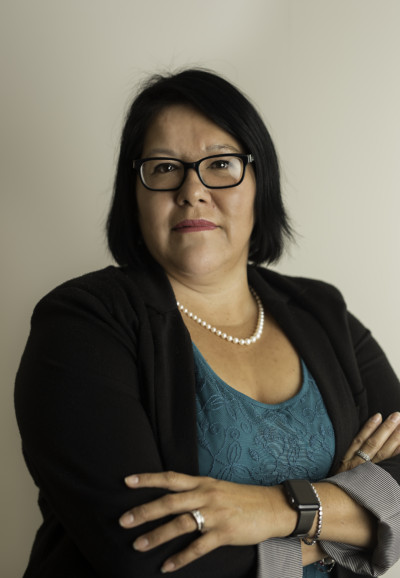Judicial accountability questioned after judge's retirement ends disciplinary proceeding
Judge Kenneth Oliver called police officer outside court proceeding to ask question about evidence
A New Brunswick defence lawyer is raising concerns about how judges are disciplined, after a provincial court judge retired before the Judicial Council concluded its disciplinary proceedings against him for misconduct.
Kenneth Oliver retired from his role as a provincial court judge on Nov. 5, just weeks after the province's Appeal Court ruled in favour of Scott Morrison, who argued his four criminal convictions should be stayed because Oliver personally contacted a police officer involved in the case to ask a question about evidence presented at trial.
But other than being suspended, any disciplinary action Oliver might have been subjected to remains a mystery to Ben Reentovich, appellate counsel for the New Brunswick Legal Aid Service Commission, and the lawyer who represented Morrison.
"Judges are foundational, they're the backbone to the the justice system," Reentovich said. "It doesn't work without a judge that's impartial, that follows the rules that you know, makes sure the law is properly applied.
"And if a judge errs or … if there's an issue, then you know, we need to know the justice system is taking steps to make sure that, you know, justice … is not only done, but seen to be done."
How incident arose
According to Morrison's appeal, he was charged with several drug trafficking offences in 2021, and in April 2022, he underwent a blended trial and voir dire, with Oliver presiding.
Part of the voir dire was to determine if Morrison's Charter rights had been breached when police searched the vehicle he was driving on the day the charges stemmed from.
Arguments on the voir dire were heard on June 7, and Oliver reserved his decision and set the matter over to July 20, 2022.
After submissions were made, a Crown prosecutor in the case disclosed that Oliver, in order to clarify information about the evidence presented, personally contacted the police officer who filed the request for the search warrant of Morrison's vehicle.
Reentovich requested a stay of the proceedings, but instead, Oliver declared a mistrial, while defending his actions as simply trying to clarify an "apparent inconsistency in an exhibit."
Oliver was suspended from the bench when his actions came to light, and Judge Jeffrey Lantz, chief provincial judge of Prince Edward Island, was brought in to take over the case.
There is no question that Judge Oliver acted in a manner that undermined his independence.
- Ben Reentovich, lawyer representing Scott Morrison
Reentovich filed another application for a stay, which would amount to a permanent pause of the proceedings, but Lantz rejected it, saying that Oliver's action was an isolated incident, and that any disciplinary action he'd face would remedy the wrong that had been done.
Morrison was ultimately convicted of a single count of trafficking cocaine, one count of failing to stop for police and two counts of possessing stolen property, and was sentenced to three months in jail, to be served concurrently.
On July 7, Morrison filed an appeal of Lantz's decision, arguing he erred in not granting the stay of proceedings.
"There is no question that Judge Oliver acted in a manner that undermined his independence and called into question the integrity of the administration of justice," Reentovich wrote in the appeal.
"The open court principle is one that is fiercely guarded and rightly so. In order to maintain public confidence in the criminal justice system, members of the public and accused persons must be assured that nothing occurs behind closed doors under a veil of secrecy."
On Oct. 10, the Appeal Court agreed to set aside the convictions and stay the proceedings, with the written reasons still to be released.
A government of New Brunswick news release indicates Oliver was appointed a provincial court judge in April 2012.
He received his law degree from the University of New Brunswick and was called to the bar in 1984. He worked for the same law firm until 2000, and then went on to become a Crown prosecutor in Fredericton and Woodstock, according to the news release.
CBC News asked the Department of Justice for an interview about Oliver's judicial misconduct, and whether any disciplinary actions were taken.
In an email response, Caroline Lafontaine, registrar for New Brunswick's courts, said Oliver's retirement on Nov. 5 means the Judicial Council no longer has jurisdiction over the matter, bringing an end to the disciplinary proceeding against him.
When CBC News asked for further details about what the disciplinary proceeding against Oliver would have entailed, Lafontaine referred to the Provincial Court Act but didn't specify the relevant sections.
"It is not for me to speculate on what evidence would have been called and what the outcome might have been," she said in an email.
Oliver declined to provide an interview.
Reentovich said the outcome offers "cold comfort" for those left with questions about Oliver's actions.
"My issue with all this is the process for determining whether a judge's conduct was inappropriate is all behind closed doors," he said, adding he only knew of Morrison's initial suspension through a news story.
"There's not this transparency to say, 'Look, judges are human, this judge made a mistake' ... and if there needs to be remedial action, 'Here's the remedial action.'"
The Appeal Court decision represents a second victory for Morrison, who's previously challenged New Brunswick's justice system for wrongs against him.
The New Brunswick Court of Appeal set aside convictions for three charges Scott Morrison was facing three months in jail for. (Fredericton provincial court)
Last December, a provincial court judge agreed to lessen a separate eight-count drug trafficking conviction by four months after Morrison successfully argued his charter rights were violated when Saint John jail guards punched him while he was on remand in September 2022.
That decision reduced Morrison's sentence to a total of 29 months in prison.
The four charges most recently stayed would have added three months to that sentence, said Reentovich, adding that Morrison at this time is likely either applying for day parole or has already been granted it.
Reply to David Amos
Reply to David Amos
"The open court principle is one that is fiercely guarded and rightly so. In order to maintain public confidence in the criminal justice system, members of the public and accused persons must be assured that nothing occurs behind closed doors under a veil of secrecy."
Ken Oliver should have still been disciplined in some fashion. Eveen judges should not be exempt
Reply to Sarah Brown
Check out Rule 55 of the federal court rules
Welcome to Higgs' dystopian oligarchy. Classic.
David Amos
Reply to Wilbur Ross
Welcome back to the circus
Reply to David Amos
Get that obsession thing looked at, it is not healthy.
Reply to Ronald Miller
At least I use my real name
Archie MacDaniel
David Amos
Reply to Archie MacDaniel
Reply to Wilbur Ross
The RCMP do this all the time.... why is anyone surprised?
It's called a double standard.
Reply to Jack Bell
Being a police officer is not comparable to being a judge. Police officers need to investigate so of course they would ask questions
Reply to Sarah Brown
Not asking question, but avoiding responsibility.
"Kennebecasis officer suspended with pay for 4 years now plans to retire"
https://www.cbc.ca/news/canada/new-brunswick/jeff-porter-kennebecasis-police-commission-retire-arbitration-1.5776832
Reply to Jack Bell
Bingo
Judges are people too. I know of at least one case of a person who did not get a fair hearing because he presented his own case in a civil matter, and the judge (who must have been having a bad day) simply shut down all of his arguments, merely telling him that she should have retained the services of an attorney.
David Amos
Reply to DJ Williams
That happens all the time
412 Queen St., Suite 210
Fredericton, New Brunswick
E3B 1B6
Telephone: (506) 444-5539
FAX: (506) 462-2290
Email: ben.reentovich@gnb.ca
Vincent Chiao

Jackman Law Building
Room J332
78 Queen's Park
Toronto, Ontario M5S 2C5
Vincent Chiao, B.A. (University of Virginia), Ph.D. (Northwestern), J.D. (Harvard), researches and teaches primarily in the area of criminal law and criminal justice, with a particular interest in the philosophical examination of its doctrine and institutions. He is the author of Criminal Law in the Age of the Administrative State (Oxford University Press 2018).
See also the Law & Philosophy focus area.
History
Legal Aid New Brunswick (LANB) was officially established as the province’s Legal Aid Plan in 1971 with a mandate to provide certain criminal and civil legal services to low-income individuals. To ensure the impartial administration of justice, the New Brunswick Law Society, the independent, self-regulatory body of the legal profession, assumed responsibility for administering the Plan. A judicature delivery model was employed, whereby Area Directors hired private lawyers on a case-by-case basis, as prescribed by the Legal Aid Act.
On April 1, 2001, civil legal aid was expanded to incorporate the Domestic Legal Aid (DLA) program which was transferred from the Department of Justice. Services were delivered largely by a staff of Family Solicitors who drew on private bar support if needed, such as in cases of conflict of interest. DLA introduced the mixed model of staff and private counsel service delivery to LANB.
In 2003, the federal Department of Justice committed to a three-year Legal Aid Service Renewal Strategy to address justice efficiencies and access to justice. An Investment Fund was established to stimulate innovation in legal aid. The staffed component of legal aid service was expanded beyond family counsel to include staff criminal defence counsel.
On December 12, 2005, An Act to Amend the Legal Aid Act was proclaimed to establish the New Brunswick Legal Aid Services Commission (NBLASC), charged to continue the mandate to deliver criminal defence and family legal counsel to citizens of the province who otherwise could not access it.
In 2009-2010, intake services for family legal aid were expanded when eligibility screening for services formerly captured under the Domestic Legal Aid program was transferred to the Commission from the Department of Justice and Consumer Affairs. Eligibility for these services is no longer restricted to victims of domestic violence. The streamlined intake process also improved consistency in applications.
On July 1, 2012, the Office of the Public Trustee transferred from the Department of Justice and Attorney General to the NBLASC. The Public Trustee of New Brunswick operates under provincial law, to protect the interests, both financial and personal, of elderly people, persons with disabilities, children, missing persons, and deceased persons, when there is no one else able and willing to do so.
On April 15, 2017, NBLASC implemented new financial eligibility criteria for Criminal Law and Family Law certificate services. Financial eligibility is now determined using an Income Grid defining income brackets per household size.
On May 1, 2018, the Intimate Partner Violence Intervention Act was proclaimed to provide victims of intimate partner violence additional tools to increase their safety while seeking more permanent solutions. Family Duty Counsel and Family Legal Aid services were expanded to provide services under the new act, as well as services under the Family Homes on Reserves and Matrimonial Interest of Rights Act.
In 2020-2021 Family Law Services were expanded to include services under the Divorce Act.
Board of Directors
A Board of five to seven Directors governs the policies and strategic priorities of the Commission and ensures the funding received is spent efficiently by reporting to the Legislature through the Minister of Justice and Attorney General. It also assures the public that the actual operation of the legal aid system is separate from the government which is responsible for public prosecutions. Members of the board are appointed by the Lieutenant-Governor in Council.
Members of the NBLASC Board of Directors

Chair
Irwin Lampert
(Moncton)

Vice-Chair
David Ames, QC, LL.B.
(St. Stephen)

Director
Bernard Arseneau
(Fredericton)

Director
Marilyn Luscombe, BSc, BEd, MEd, ICD.D (Fredericton)

Director
Tammy Augustine, LL.B.
(Elsipogtog)

Director
Daniel Jardine
(Miramichi)

Director
Tanya Chapman, BA, BEd, MBA, CPHR (Saint John)
Senior Management Team
Senior management accounts for staff performance by monitoring and reporting on client service. Services are coordinated across the province to ensure the same services are available in all areas of the province.
Members of the Senior Management
Directors

Chantal Landry, B.A., LL.B.
Executive Director and Public Trustee
Email: ChantalM.Landry@gnb.ca

Hassan Mansour, CPA, CGA, MBA
Chief Financial Officer/Director of Corporate Services
Email: Hassan.Mansour@gnb.ca

Sylvain Pelletier, LL.B.
Director of Criminal Law Services
Regional Manager – Bathurst, Edmundston, Campbellton
Email: Sylvain.Pelletier@gnb.ca

Robin Corey, IPMA-ACP
Director of Human Resources
Email: Robin.Corey@gnb.ca

Melanie Cassidy, LL.B.
Acting Director of Family Law Services
Email: Melanie.Cassidy@gnb.ca
Managers

Margaret Gallagher, K.C.
Regional Manager – Saint John
Email: Margaret.Gallagher@gnb.ca

Martin Goguen, B.B.A., LL.B., M.B.A
Regional Manager – Moncton
Email: Martin.Goguen@gnb.ca

Charlotte Cowley, B.A., LL.B.
Regional Manager – Fredericton, Woodstock, Miramichi
Email: Charlotte.Cowley@gnb.ca

Misty Matthews-Emery, B.A., LL.B.
Acting Manager of Child Protection Law Services
Acting Assistant Director of Family Law Services
Saint John, Fredericton, Woodstock
Email: Misty.Matthews-Emery@gnb.ca

Carla Keenan
Intake Manager
Email: carla.keenan@gnb.ca

Lynn McMinniman, CPA, CGA
Manager of Trust Accounting and Taxation – Public Trustee Services
Email: Lynn.McMinniman@gnb.ca
Lawyers threaten to withhold services to back stenos
Striking court stenographers picked up support Monday from defence lawyers. The lawyers are threatening to withhold legal aid services unless the province settles the strike. That could mean more cases will be thrown out of court.
At a meeting in Fredericton the lawyers traded stories about the inconvenience the nine week strike has caused. They said there had been trial delays and delays in getting transcripts and documents. They accuse the province of not acting in good faith.
One service they are threatening to withhold is answering "Bridges calls," the free calls people make to a legal aid lawyer anytime day or night. They don't get paid to answer them and now they say won't unless the government makes a deal with the stenos.
Lawyer Danny Watters has already stopped.
For 24 years, I've told any police officer, anybody in custody, anybody detained, call me, I'm available 24 hours a day. When I see the shabby treatment that the employees have had in this whole situation, I'm withholding that. I will not answer any more phone calls.
Watters says that means some criminals may just walk out of court.
Justice minister Brad Green wouldn't speculate on the impact of the lawyers' protest.
I know that the department, the government of New Brunswick, the stenographers themselves, the judiciary, the police, everyone involved would like to see this strike end. But it will only happen when both sides are ready to sit down with reasonable positions and a close to thirty per cent wage demand on the part of CUPE is not a reasonable position.
So far, the government has offered just a 7.5 percent wage increase. Striking stenographers and their supporters demonstrated at the Legislature twice in the past week, demanding wage parity with their counterparts in other Maritime provinces. They're also asking for binding arbitration but so far, the government hasn't agreed to that, either.
Put legal bill on the feds tab, says justice minister
New Brunswick's minister of justice says the province can't afford to pay the legal bill for native fishermen in Burnt Church. Last week, a provincial court judge ruled that two members of the Burnt Church band are entitled to legal aid, but he didn't specify which government will get the bill.
New Brunswick MLAs say they're not opposed to legal aid for those facing charges in Burnt Church. However, Liberal Leader Bernard Richard says many native people are involved, the treaty issues are complex, and the cases could take months if not years to resolve.
Tuesday in the legislature, Richard raised the issue before the justice minister.
"I was concerned that the province might be stuck with the bill because there will be many others of these types of charges," said Richard. "This is just the tip of the iceberg actually. If the province has to start picking up the bill for these cases, it's going to be very expensive indeed."
Justice Minister Brad Green says the province doesn't have the money to cover what could be multimillion-dollar legal bills. He says he's hoping the federal government will come through with the cash.
"It's our belief as a provincial government that the responsibility should be borne by Ottawa," he said. "Not only for the charges which are being prosecuted by federal prosecutors under the Federal Fisheries Act, but also all of the charges related to the activities at Burnt Church."
Green says the government is discussing the situation with the federal government right now. He says the provincial legal aid program can administer this file but the province doesn't have the resources to pick up the tab.
Cabinet accepts guilty judge's resignation
The New Brunswick government will accept the resignation of a provincial court judge convicted of fraud and is preparing the paperwork to cut off his $151,000 salary and benefits.
Judge Drew Stymiest, who served more than 20 years on the bench, was convicted Tuesday of 20 counts of fraud and breach of trust in a scheme that swindled nearly $1 million from the Miramichi Regional Health Authority.
Stymiest faxed his four-line resignation to Justice Minister Brad Green's office on Wednesday.Stymiest made history this week as the first New Brunswick judge to be convicted on fraud charges. He and three former directors of the corporation were found guilty in a financial conspiracy that siphoned money away from the Miramichi health care system.
- FROM MARCH 20, 2003: Accused judge will stay on provincial payroll
Stymiest took sick leave in October 2001 when Miramichi City Police began investigating allegations of financial misdealings at the health authority, of which the judge was chairman of the board. In January 2002, he returned to the bench but was not assigned any cases. He was suspended with pay in June 2003. He has been collecting his salary all along.
Justice Department spokesman Gary Toft says the government is investigating options to recoup some of the losses connected with the crime including Stymiest's salary and benefits while the investigation and trial was ongoing. It is unclear what will happen to the judge's pension fund. "We will be looking at all of our options," Toft said.
Toft says the Nova Scotia Crown prosecutors may file a restitution order when the four men are sentenced at the end of March.
Saint John lawyer John Barry says Judge Stymiest's conduct has caused great concern among those in the legal community.
"The province's judges are extremely concerned about the impression it gives that a member of the bench would become involved in most serious charges. Independence of the court and respect for justice is one of the paramount aspects of our Canadian system of democracy. They were shocked when it happened. Nobody could believe it."
The resignation was expected after Judge Stymiest and three others were convicted in a four-month trial that ended on Tuesday. It was the longest fraud trial in the history of New Brunswick.
The men, including former health authority CEO John Tucker, former finance vice-president Ian Jamieson, and former vice-president of supply and services Darrell Doucette, are being held in police custody awaiting sentencing at the end of March.
Mayor John McKay says the entire affair is a tragedy for his community and trust will take a long time to rebuild. "I'm a member of the Rotary club of Newcastle and Chatham that raised more than a million dollars to buy equipment for the hospital that the hospital couldn't afford to buy. Now we know, perhaps, why the hospital couldn't afford that. This conspiracy is shameful."
McKay says the City of Miramichi spent tens of thousands of dollars on the initial police investigation, money that he is trying to recoup. "The city has paid huge amounts from this investigation. We're still getting bills, and I mean many, many tens of thousands of dollars, and I don't think it's proper that the taxpayers of the City of Miramichi should be on the hook to finance an investigation into a conspiracy to defraud the people of the Miramichi and to defraud the hospital."
At trial, the Crown said the men wrote and cashed illegal cheques between 1994 and 2000.
Miramichi Regional Health Authority is now trying to move forward from the trial and the guilty verdicts and build trust in the community.
Authority spokesperson Sonya Green Haché says the new board is working hard to improve accountability with the community and government.
"We've strengthened our financial controls. We have also re-organized our senior management team since 2000, and our board was reinstated in 2001."


"And if a judge errs or … if there's an issue, then you know, we need to know the justice system is taking steps to make sure that, you know, justice … is not only done, but seen to be done."
Yea Right
Rules Applicable to All Proceedings
55 In special circumstances, in a proceeding, the Court may vary a rule or dispense with compliance with a rule.
SOR/2004-283, s. 11